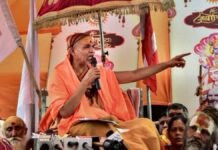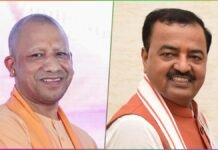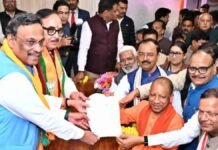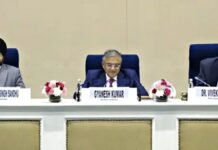
Key Points:
- The Ban: The Uttar Pradesh government has banned all caste-based political rallies and the public display of caste identity, calling it a threat to “public order and national unity”.
- The Ruling: The move follows a landmark judgment by Justice Vinod Diwakar of the Allahabad High Court, who termed caste glorification “anti-national”.
- No Caste in Police Records: The court ordered the removal of caste references from all police documents, including FIRs, charge sheets, and arrest memos, calling the practice a “legal fallacy” in the modern era.
- Wider Scope: The ban extends to caste-based slogans on vehicles, public signboards, and online content that promotes caste hatred.
- The Exception: Mention of caste is still permitted where legally required, such as in cases filed under the SC/ST (Prevention of Atrocities) Act.
Lucknow: In a historic move set to reshape the social and political landscape of Uttar Pradesh, the state government has issued a sweeping order banning all caste-based rallies and prohibiting the mention of caste in most official documents and public spaces. The directive follows a powerful judgment from the Allahabad High Court that branded the glorification of caste as “anti-national”.
The government’s 10-point order, issued by the Chief Secretary on September 21, implements the court’s directives and aims to dismantle systemic practices that reinforce caste divisions ahead of the 2027 assembly elections.
The “Anti-National” Ruling That Sparked the Change
The entire process was initiated by a landmark judgment delivered by Justice Vinod Diwakar on September 19, 2025. The case involved an accused in a liquor smuggling case, Praveen Chhetri, who objected to his caste being mentioned in the FIR.
While hearing the plea, Justice Diwakar expanded the scope to address the broader issue of caste profiling. He ruled that in the 21st century, reverence for the Constitution, not one’s lineage, is the “highest form of patriotism”. Citing Dr. B.R. Ambedkar’s warning that “castes are anti-national,” the court stated that for India to become a developed nation by 2047, the caste system must be eradicated.
The court explicitly rejected the justification from the Director General of Police (DGP) that caste was used for identification, calling it a “legal fallacy” when modern tools like Aadhaar, fingerprints, and parental details are available.
Sweeping Changes: From FIRs to Vehicle Number Plates
Following the court’s order, the UP government has mandated a series of comprehensive changes:
- Police Records: The caste of any accused, witness, or complainant will no longer be recorded in FIRs, charge sheets, arrest memos, or on police station notice boards. For identification, the mother’s name will now be included alongside the father’s.
- Public Displays: All caste-based signboards on public property or those declaring an area as belonging to a particular caste are to be removed.
- Vehicles: The court directed the government to amend motor vehicle rules to explicitly ban caste-based slogans or identifiers on all private and public vehicles, with heavy fines for violators.
- Digital Content: Authorities will use the IT Act to take strict action against social media content on platforms like YouTube and Instagram that glorifies caste or spreads hatred.
The only exception to this rule is in cases where mentioning caste is a statutory requirement, most notably under the Scheduled Castes and Scheduled Tribes (Prevention of Atrocities) Act, 1989. The ban on political rallies is expected to significantly alter the campaign strategies of all major political parties in the state, including the BJP, Samajwadi Party, BSP, and smaller caste-based parties, who have historically relied on caste mobilization.





















































